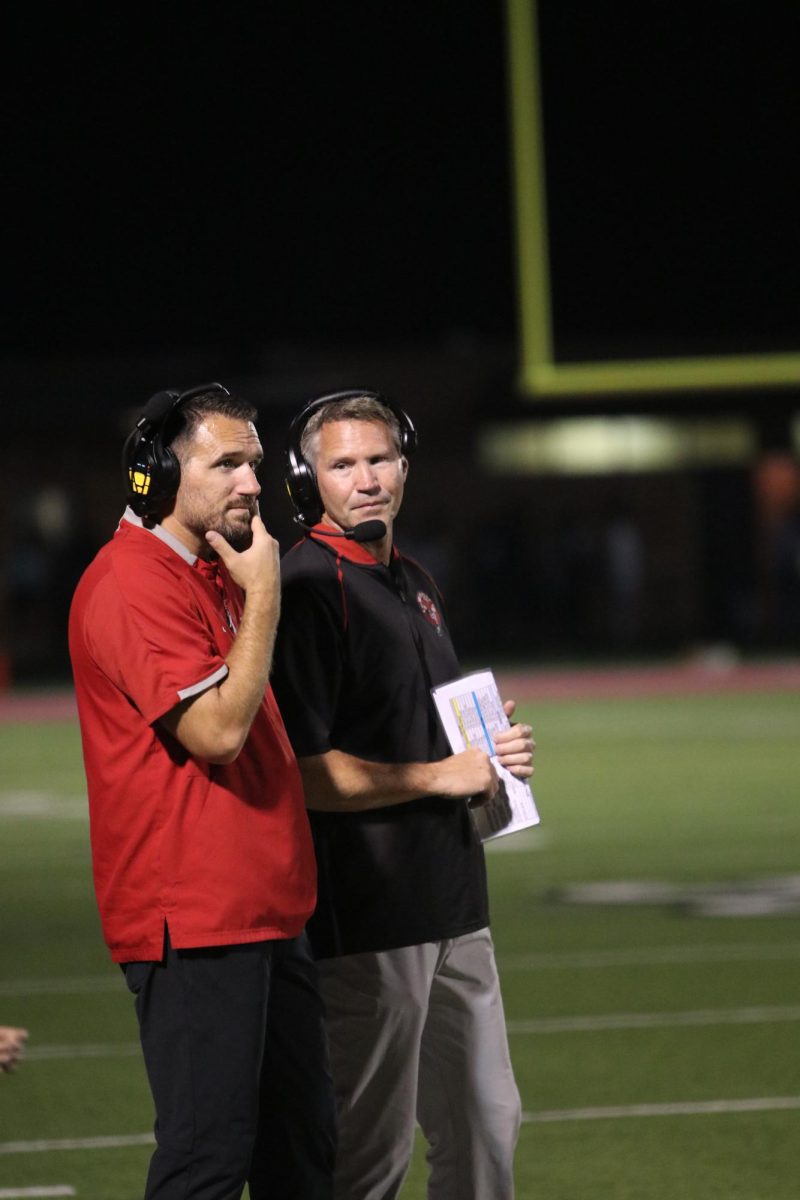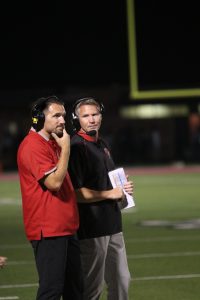Teachers say lack of info hurts safety
District, teachers at odds over safety provisions in contract, adherence to current law in question
Supporting the cause, community members of all ages gather to support teachers on Sept. 6 outside Liberty Memorial Middle School. Parents, teachers and students from across the district stood together on what was supposed to be Liberty’s open house night, a night teachers aren’t specifically paid to attend. “It’s a hard place to be when you’re a teacher, because they care so much about our kids, their jobs and their professions and doing what’s right,” said Jenny Skillman, the leader of the initiative.
September 20, 2018
Questions about how to ensure teacher safety are among the unresolved issues as teachers and the district remain at odds over teacher contracts.
Both sides are waiting to meet with a mediator after reaching an impasse late last month. Much of the focus has been on teachers’ requests for a bump in pay beyond district offers to add $500 to the base salary — an amount teachers have scoffed at since the state increased district funding by $4.8 million this year.
But teachers with the Lawrence Education Association say they are also concerned by the district’s adamant opposition to adding language to the contract that would address teachers’ concerns about sharing student behaviors. This includes sharing knowledge of students who have violent or otherwise concerning histories — something teachers say is far from routine in USD 497.
The teachers’ union specifically asked that language in the contract be added to ensure administrators make teachers aware if they have a student who could pose a threat to teachers or other students. Examples may include, but are not limited to, a history of violent outbursts, self-harm or sexual offenses.
“When a student with a history of behaviors that may pose a threat to the safety of students and/or staff is placed in a teacher’s class, the teacher shall be informed of the student’s history of behaviors,” the proposed policy stated.
English and theater teacher Jamie Johnson said such information is important in order to maintain a safe learning environment.
“I’d feel far more comfortable in my classroom having this information,” Johnson said.
This sentiment is shared by teachers across the district.
“Think of it this way,” Free State teacher David Reber said. “If a student had a peanut allergy and nobody told the teacher, that teacher and student would probably be fine 99 percent of the time. But, there is also a chance that the student might be dead. Knowledge could have prevented that.”
But the district refused to add to the contract additional notification requirements for teachers. In particular, the district was concerned about additional changes suggested by teachers that would allow teachers to remove students from their rooms.
“The ultimate decision to remove a student from a classroom is an administrative function and procedures transferring an administrative decision to the teacher is [sic] should not be placed in the Master Agreement,” the district said in a written response at its last negotiations meeting on Aug. 29.
Furthermore, the district said, such changes could disproportionately affect students of color.
“Another broad area of concern is the impact the LEA language will have on the district’s equity work,” the district countered in its response at the late August meeting. “The goal should be to keep students in the classroom through the implementation of programming and professional development to address and improve behavior and reduce the punitive nature of interactions with students.”
Yet, adding the language to teacher contracts would build on existing requirements in state law and a district policy that does require notification of teachers in certain instances.
State law (KSA 72-89b03) requires that school employees should inform the superintendent when they have a student who has been convicted of a felony-level offense or has a related expulsion. The superintendent is then to investigate, and any school employee likely to work with that student is to be informed if the offense happened within the last 365 days.
If it is found that the student’s history had not been reported to their teachers, USD 497 policy says the superintendent will investigate where the miscommunication has been.
But nine high school teachers in USD 497 said they have never been notified of students with troubling behavior or violent histories, despite later learning that they had taught students with such past behaviors. Several spoke on the condition of anonymity, and cited student histories that included sexual assault and violent threats.
“I have been working for 22 years, and at Free State for 12 of those years,” Free State journalism adviser and LEA President Laurie Folsom said. “I have never had an admin tell me that I have had a student that has ever been a danger to themselves or to others. I find that really hard to believe.”
David Cunningham, executive director of human resources and chief legal counsel in USD 497, acknowledged possible issues. His responses to The Budget’s questions were passed along in an email from Julie Boyle, the district’s executive director of communications.
“I cannot speak to the history [of how often teachers are notified via the policy], however, I am aware of a recent concern raised about a situation where a teacher was not notified,” Cunningham’s response said. “It is our expectation that administrators follow all board policies.”
He said he wasn’t aware of how often the superintendent is called on to investigate issues, as is called for in state law and district policy.
“Unless staff makes the superintendent aware of a student with a criminal conviction, no investigation is possible,” Cunningham said. “I believe it is infrequent that we have students who have been convicted of a felony within the past 365 days that requires notification. It is also important to remember students are normally juveniles and those records are confidential, so it is possible we may never know if there has been a conviction. It is a challenge for a school district to learn this kind of information about a student.”
Cunningham said staff members don’t go through specific training informing them of the requirement that information about expulsions and felony-level offenses be investigated.
“Training is not a necessary component of meeting the statutory and policy requirements,” he said. “If a staff person becomes aware of a student who has a conviction, the person should report it to the building principal and the superintendent. The building principal will communicate to affected staff once the investigation supports the need to notify.”
This week, Cunningham cited the state law as a reason notification requirements didn’t need to be added to teacher contracts. When it comes to improving communication with teachers on such issues, he said efforts are ongoing.
“…the district continues to work to ensure administrators understand reporting requirements so that we have an appropriate balance between protecting a students’ right to confidentiality and staff’s need to know if there are safety concerns,” he said in a statement passed along by Boyle.
Too often, Folsom said, teachers are not being informed.
“Treat us like professionals,” she said. “Expect us to act like professionals, deal with the bad actors and empower the majority of teachers to do the right thing. If the district doesn’t believe at their core level that we will do the right thing, I think that is the worst statement they can say to us, and so we are left to assume at this point that is what they think.”
Johnson says she doesn’t understand why she wouldn’t be informed of a student’s history in order to protect the safety of her students.
“It’s my job to keep my students safe, and that job gets bigger and scarier every year.” Johnson says, “I think that we have to keep our wits about us, of course, but I’d feel far more comfortable in my classroom having this information.”
















